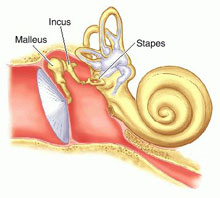Auditory Approach System
is the sensory system for the sense of hearing this encapsulates the sensory organs and sensory system. The ear has three main parts outer, middle, and inner ear.
The outer ear (External Ear) consists of the auricle and the external auditory meatus, At the top, the auricle is surrounded by a lid-like structure. the bottom or inferior portion of the auricle has the ear lobe. The auricle of the ear is composed of elastic cartilage which gives it its unique flexibility. The auricle's main function is to gather data from the outside world and funnel it to the external auditory meatus.
The middle ear is separated from the external ear by the tympanic membrane (Ear Drum). As the sound gets funneled to the middle ear the eardrum vibrates and transfers the waves to the tiny bones called ossicles that lie in the tympanic cavity of the middle ear. There are three ossicles, and their names are Malleus (the hammer), The incus (anvil), and the stapes (stirrup.)The middle ear functions by converting energy from sound pressure waves to a force upon the liquid (Perilymph) of the oval window of the inner ear. The oval window is smaller than the tympanic membrane, so the force/pressure increases, therefore, being able to move the liquid within the inner ear. The middle ear also contains the Eustachian tube which connects the tympanic and nasal cavities. This function is to allow the middle air pressure to equalize between the ear and the throat.
Lastly, the Inner Ear (Internal Ear)- detects sensory information for sound and balance. This part of the ear is responsible for balance/equilibrium and sound interpretation. The inner ear hosts the vestibule, semicircular canals, and the cochlea. The cochlea’s function is to convert sound pressure into electrochemical impulses to the brain by the auditory nerve (Vestibulocochlear Nerve-Cranial nerve XIII.)With all the anatomy being stated Auditory Approach system is how we hear and process things within the environment. When we hear future sounds it’s a warning of what may happen next.




This was very informative and it gave me a deeper understanding of the parts of the ear. The baseball with visual impairments goes to show how important it is to use ones other senses to help them. It is a very fascinating thing that we are capable as people to learn how to rely on certain senses when others are not as strong.
ReplyDeleteInteresting post to go into depth about the ear. It is important to learn the structure of our ears especially in the terms of auditory warnings. This allows us to be provided with information and then prompting the correct behavior. Great post!
ReplyDelete